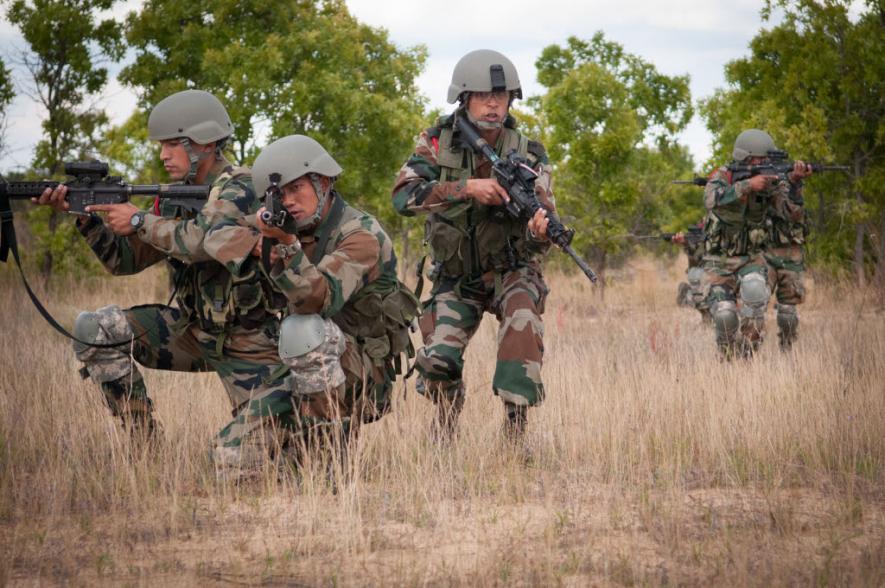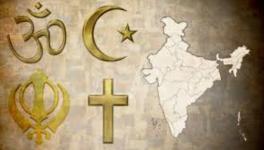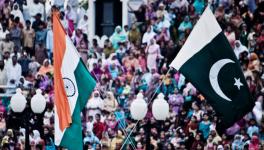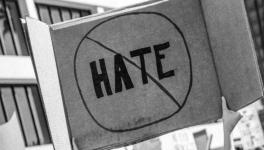Nationalism and Humanism in the Indian State

Representational image. | Image Courtesy: Wikimedia Commons
Where have all the soldiers gone
Long time passing
Where have all the soldiers gone
Gone to graveyards everyone. . . .
Oh when will they ever learn
When will We ever learn. . . ”
(Pete Seeger, Where Have All the Flowers Gone?)
The Chief of Defence Services has recently caught the headlines with his announcement that he has plans to introduce a programme to enable patriotic young men to experience the “thrill of military professionalism” for a “tour” of three years. One does not know if he had sounded the other service chiefs before making this announcement. But military duty is normally not associated with adventure tourism. It is a serious business involving not only risks to life but is meant to achieve certain definite goals at significant cost of life and limb not to speak of materials for the greater security of the country and her civilian population. The decisions are taken with utmost circumspection and earnest preparation.
Unless the country is under a grave military threat its youths are not expected to abandon other work in which they are engaged and shoulder arms. There are other kinds of serious service they may render to the nation, such as helping alleviate poverty, spreading literacy and tending the sick and the needy. All that requires dedicated hard work. Or saving the environment. Indeed, many of them are at this very moment absorbed in such exemplary work, unmindful of rewards and recognition. The Covid-19 ravages and the state’s apparently ineffectual handling of it underline the inexorable need for trained voluntary work to help millions in distress.
Professional soldiers are unlikely to welcome such adventure-seekers among themselves, when every year jawans are getting killed while defending the border, plunging their families in grief. Besides, armed with the training but unchecked by any discipline when discharged, some might turn out to be a serious menace to law and order. Already we have shuddered enough at the crimes of the trigger-happy on several occasions. And if such trainees, trained at the expense of the state, turn against selected castes and communities the consequences will be deadlier than the Chief of Defence Staff’s intentions and ruinous to the nation. And if, as suggested by hostile critics, it means an ingenious method of replacing junior NCOs and COs depleted by terrorist strikes from across the border, then it might amount to bad faith, and one can hardly believe in such callousness.
Questions, however, have been raised at the armed forces’ inaction during the present calamity when its huge resources as well as numerous disciplined personnel could have provided much-needed succour to the vast numbers of distressed people in a well-organised manner and almost all it did was to shower flower petals from the sky on health workers and doctors. It was regarded as an incongruous extravaganza by most commentators. But the malaise lies deeper than in the ethos of the army.
The nationalism that we inherited from our awakening from colonial servitude and the freedom struggle had been moulded by people like Gandhiji and Tagore. The latter, than whom one cannot think of a greater patriot, and whose influence spread out to all spheres of modern Indian culture, regarded nationalism as some sort of a pathological phenomenon and fulminated against it. Gandhiji, on the very eve of independence, spent his time in East Pakistan with a handful of followers desperately trying, and succeeding, in bringing about peace and harmony between hate-crazed Muslims and panic-stricken Hindus. Before being gunned down by a Hindu fanatic he had single-handedly restored communal peace and harmony in Delhi, battling against waves of demented violence and terror against Muslim residents.
And it will only be a blind fool who would deny the seminal role of both in the making of the nation. The dimension that they added to the ideals and discourse of nationalism in India was in fact the heritage of Indian humanism leavened with religion flowing from the great medieval Bhakti tradition. Our nationalism turns into an arid waste when torn from those roots, and the danger today is that a heartless militaristic ethos might replace it if we do not stand up in defence of our kind of nationalism.
Personally I am more comfortable with the original ideas of the French Revolution, which in their broad version combined respect for fundamental liberties with firm guarantees of social security,as reflected in the early Napoleonic reforms. These had no truck with religion without however coming short on social compassion and empowerment of the common man. But one has to concede that the popular syncretist sentiments of the religious Bhakti movement,as exemplified by Gandhiji’s favourite author of Bhajans, saint Narsi Mehta, and by the Baul tradition as represented by Tagore’s favourite, Lalan Fakir, also created a different kind of alchemy that combined the passion for human solidarity with a grasp of the inalienable dignity of the human individual. It transcended narrow religious orthodoxies. (I was thrilled to know that Muchkund Dubey, nonagenarian former foreign secretary, had recently brought out a translation of Lalan Fakir’s songs with original Bengali texts and a fifty-six page introduction.)
It might sound quite out of the world to potter about with the fading and fuzzy idea of humanism at a time when the human race is locked in a chaotic life-and-death struggle with a deadly virus. The fact is, we are still saddled with the idea and it still underpins many of our social beliefs and state institutions. But its promise is yet to be fulfilled. The example of Western humanism inspired our forefathers to locate a forgotten Indian heritage. It ought in fact to inform our state efforts to contain and conquer the menace, while the plain fact is that it is negated day after day by the facts on the ground.
Our humanism springs from the faith that man has an intrinsic worth that he has acquired over millennia of struggle with hostile forces of nature, and from learning to find nurture from her gifts, quite different from the idea of fearful submission to nature, fate and the gods as well as from ruthless and mindless attempts to dominate. Our politics of rights has or ought to have this dimension of love and compassion. And it ought to be a source of moral sustenance when we are striving to gain control of the pandemic in solidarity with the rest of the world. Our state is supposed to be the human instrument to serve those ends. The ringing words of our Constitution resound with this faith.
One recalls Gandhiji’s much-quoted remark that a free India must wipe every tear from the eyes of her most hungry and helpless children. Not that the two great iconic figures favoured a paternalistic state overarching common life. In the new India of their dreams the common man was to be very much a free and voluntary agent in cooperatives that together would compose the state. The bureaucracy that was later to dominate and stifle such free social initiative was far from their dreams. But the idea somehow lived on even within dense overgrowth of such bureaucracy, and at least some bureaucrats at the local and district levels continued to foster it.
There was another contrary strand of opinion and activity in our freedom movement, inspired by examples of Italian revolutionary nationalists Mazzini and Garibaldi, popular among educated middle-class youths, aiming at political liberation of the country through armed struggle. Their social ideas were vague and they subscribed to Bankim Chandra’s vision of a band of heroic and selfless youths dedicating themselves to ridding the country of the foreign yoke by armed struggle in his novel Anandmath. Their nationalism did not take into consideration the presence of Muslim masses and oppressed castes in the land. Perhaps they unconsciously subscribed to Bankim Chandra’s idea of a “Hindu nation”. Some later even turned out to be rabid communalists, while others outgrew its spell and joined Gandhiji’s following or the communists. Indisputably, heroic sacrifices were made by them and many are still rightly honoured. Their legacy was later to mingle with that of the Hindu nationalist stream from Maharashtra. The fact remains that the social question took a back seat with them, indicating deep ingrained social conservatism. Gandhiji is the bete noire for right-wing radicals of both the streams for obvious reasons.
But today, when workers of this country are treated worse in their own land than unwelcome migrants from alien shores in certain Western countries, we wonder if that seminal and generous idea of Indian humanism is still at work. Are they being treated like human beings at all, when their civil rights do not earn them barest minimal consideration from a state that is supposed to protect them from unforeseen calamities? Not only are they not being helped to move to their homes when their workplaces were suddenly shuttered in their faces, at home they are being herded into quarantine centres with shockingly poor facilities, and being also stigmatised as carriers of the Covid-19 disease.
When the media in Assam echoed complaints of the inmates of those centres about stinking rotten food, scant supply of water and complete indifference of the administration to basic hygienic and medical precaution to prevent infection among them, the health minister of Assam retorted, “We are not inviting them to a wedding party.” This cynicism is accompanied by the usual dash and flair for which the minister has earned a name. It is more than evident that he is clueless as to how to paper over the woeful lack of resources and even more, of sufficiently well-conceived plans and preparations to meet this enormous crisis.
The catastrophe provides no opportunity for the photo-ops that politicians crave, though they make the most of the few that come along. But it provides space for a bullying and crass attitude to the people they are supposed to look after. A section of the electronic media in Assam is showing endless crowds of people returning home across the Srirampur Gate in desperate ragged uncontrolled streams with bold stickers screaming from the TV screen that it is Corona coming home.
Such trends force us to revert to the original question, are we living in an hollowed-out shell of the modern democratic state that owed its origin to the power of humanism? Was Lenin justified in dismissing the state as a committee of ruling classes to organise politics to serve their interests?
So is it the sunset of the kind of state that our thought still falsely conjures when it is buried deep in oblivion? Much depends on how we answer this question today. Politics is too serious a matter to be left to politicians!
For decades now, let us admit, we have watched the humanist foundations of the state crumbling in apathy. And this is not intended to be a catfight in some scholarly back-alley, but an attempt to see past mountains of academic waste. The building of a temple to a deity of a dominant religion has turbulently engaged the imagination and passions of the nation for three decades or so, leading to deep divisions. The state has indirectly and ironically helped in bringing this about. Attempts to deflect or overcome it failed or proved lukewarm.
The danger from such inflamed divisive passion was underestimated by liberal politicians who thought there was a way of buying it out or diluting it with concessions. To be sure, the left grasped it firmly and at a late hour rang out warnings time and again. But they were ruled out by liberal intellectuals and journalists who imagined that their jaded secular discourse had outlived its time and the moment has arrived for fresh creative turns in politics. In this new scenario producers were only to serve as tools of far-sighted entrepreneurs and financiers, and meanwhile the masses may be kept happy with holy dolls. How delusory that hope has turned out to be! In the meantime the humanist core of our Constitution has at some point on the road been abandoned.
Now we find the state has been hijacked by “nationalists” who think humanism is an imported impurity best left behind on the garbage heap. The new nation is to be “integral” and what better instance of integration than the army? Military passion is considered by monopolists of both wealth and power as the best tonic to revive the nation to its pristine vigour. Within the nation vigilantism against “impure” minorities is the projected norm of patriotism and sabre-rattling up front is to be the mark of rejuvenated nationhood. The ground for it has been created by riots in small towns in the interior or countryside for decades, and report after report by inquiry commissions had exposed before our eyes the strategic role of riots in fomenting hatred and consolidating partisan passion.
Our eyes were focussed solely on “development” which was expected to wash all that muck away. Ideas took a back seat in mature post-modernist thinking and the market and its dice were to provide native visionaries with plum opportunities and challenges. The miracles of technology were in high demand while the reason of science was in discount. The ideological vacuum seems to have been filled by default with the other strand of nationalism, alien to Gandhiji and Tagore, which has been burrowing underground.
The symptoms ought to be read correctly and a strenuous effort to tame the incubus and reclaim the state for its humanist core ought to follow. It is a pity that electoral calculations seem in some cases to overwhelm judgment and scuttle the attempt. All the more reason for those who understand the danger better to work all the harder with patient resolution to bring everyone around to a clear recognition of the malady and the urgent need for cure.
At the end of the day we do not want our young men and women to turn into demented flag-waving and/or gun-toting mobs. We want them to value life. We want them to be honest decent responsible citizens doing their duty by the nation in different fields inculcated with love for their countrymen which is expressed in acts of sympathy, compassion and concern. So as to turn their fortunes around. To make that possible we shall need development that does not mean a bug-eyed craze for enrichment of a few mouthing slogans of “excellence” and “merit” and denying the barest wherewithal to enable an honourable human existence to the many. Above all we want the state to have a heart.
The author is a socio-political commentator and cultural critic. The views are personal.
Get the latest reports & analysis with people's perspective on Protests, movements & deep analytical videos, discussions of the current affairs in your Telegram app. Subscribe to NewsClick's Telegram channel & get Real-Time updates on stories, as they get published on our website.























